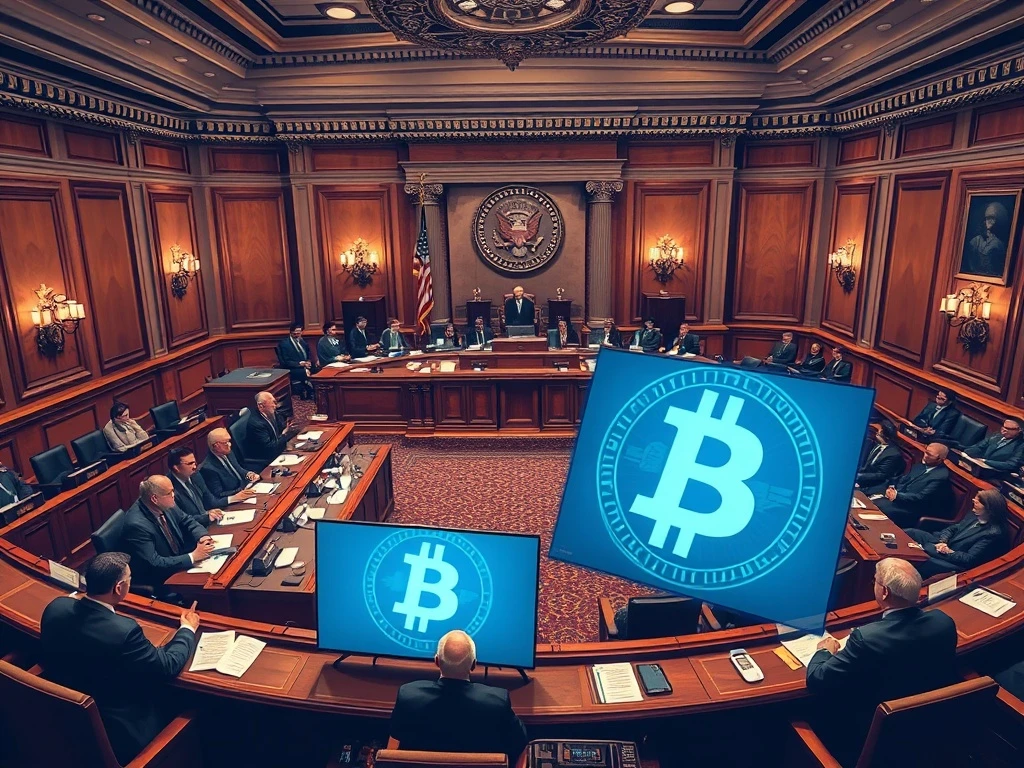Heated Congress Crypto Debate: ‘GOP Giveaway’ Claims Surface on Key Bills

Capitol Hill kicked off what many are calling “crypto week,” bringing the ongoing Congress crypto debate back into the spotlight. However, initial discussions on digital asset legislation quickly took a sharp turn, revealing deep political divisions and accusations.
The Opening Salvo in the Congress Crypto Debate
During a recent meeting of the US House Committee on Rules, the expected focus on cryptocurrency legislation shifted almost immediately. While the intention was to debate several key crypto bills, the floor quickly turned to discussions surrounding the Department of Defense Appropriations Act.
Despite this detour, the underlying tension regarding digital asset regulation was palpable. Representative Jim McGovern of Massachusetts used his opening statement to strongly criticize Republican efforts to advance three specific bills, framing them as a significant benefit to the crypto industry at the potential expense of investors.
Understanding the Key Crypto Bills at Stake
Three pieces of legislation are central to the current congressional push. These crypto bills aim to address different aspects of the digital asset landscape:
- The Guiding and Establishing National Innovation for US Stablecoins Act (GENIUS): Focuses on creating a regulatory framework for stablecoins.
- The Digital Asset Market Clarity Act (CLARITY): Aims to provide clarity on the regulatory status of various digital assets, particularly regarding whether they are securities or commodities.
- The Anti-CBDC Surveillance State Act: Seeks to restrict the Federal Reserve’s ability to issue a central bank digital currency (CBDC).
Republicans, like North Carolina Representative Virginia Foxx, who chairs the committee, presented these bills as crucial for fostering innovation and strengthening America’s position in the global financial system. The GENIUS Act, in particular, was highlighted as a priority.
The GENIUS Act: Innovation or Giveaway?
The proposed GENIUS Act, aimed at stablecoin regulation, is a focal point of the current debate. Proponents argue it provides necessary rules for a rapidly growing sector, promoting stability and innovation. However, opponents view it differently.
Representative McGovern explicitly referred to the collection of bills, including GENIUS, as the “GOP crypto giveaway.” He argued that the proposed regulatory solutions are “weak and ineffective” and do little to protect ordinary investors, primarily benefiting wealthy individuals and industry insiders.
Challenges for US Crypto Regulation
Achieving comprehensive US crypto regulation faces significant hurdles, not least of which is the current political climate. With a slim Republican majority in the House, passing these bills will likely require some level of bipartisan support, which appears difficult to secure given the strong opposition voiced by many Democrats.
Concerns about potential conflicts of interest have also been raised, particularly regarding former President Donald Trump’s family-backed crypto ventures. Lawmakers like Maxine Waters and Adam Schiff have cited these connections as reasons for skepticism regarding the motivation behind the legislative push.
Why Some Call it a GOP Crypto Giveaway
The accusation of a “GOP crypto giveaway” stems from the perception that the proposed legislation is overly favorable to the cryptocurrency industry, potentially at the expense of robust consumer protection and market integrity. Critics argue that the bills prioritize industry growth over preventing fraud and manipulation.
Representative McGovern’s pointed remarks, such as stating he hasn’t heard constituents asking to make it easier for “crypto millionaires to get richer,” underscore this sentiment. The debate highlights a fundamental disagreement on how the US should approach regulating the complex and evolving world of digital assets.
Conclusion: A Race Against Time for Crypto Bills
While the immediate debate shifted, discussions on digital assets are expected to resume soon. Republican leaders have indicated a desire to pass all three crypto bills before the congressional August recess, leaving a narrow window for deliberation and voting. The outcome remains uncertain, with the heated political clash and claims of a “GOP crypto giveaway” casting a long shadow over the future of US crypto regulation.








